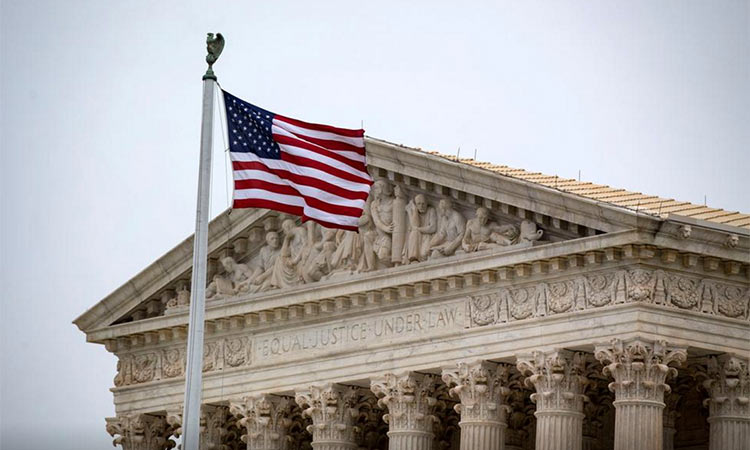Tim Scott may not have been a frontrunner — but he has paved the way for Donald Trump

Donald Trump. File
South Carolina Senator Tim Scott dramatically announced his exit from the Republican presidential primary last night. Scott made the announcement on former congressman Trey Gowdy’s show, apparently without even telling his campaign staff. Gowdy, a longtime Scott friend and ally, was visibly surprised, and even argued with Scott, saying that he should stay in the race. “You have plenty of money,” he protested. “You have the highest approval numbers of any candidate.” Scott’s high favorability ratings have fallen recently, which might explain why he exited. He’s also failed to gain ground in head-to-head polls, where he’s been at two percent or so, well behind Florida Governor Ron DeSantis, and former South Carolina governor Nikki Haley. And of course he’s far behind former President Donald Trump, who leads the field by 56 points.
Still, Gowdy’s distress is understandable. Scott had real strengths, and when he entered the race in May, he could reasonably argue he had as path to the presidency. His failure is less a referendum on his failures than it is a referendum on the failures of the Republican party in general — a party that, despite the former president’s obvious unsuitability for office and his escalating disqualifying legal troubles, appears to want to bathe in essence of Trump and in nothing but essence of Trump for all eternity.
Scott’s positive features are, as you’d expect, largely invisible to progressives and Democrats. The general consensus among is that Scott never had a chance and ran an embarrassing campaign. Democratic skepticism isn’t surprising; Scott is extremely conservative. He’s backed a cruel, draconian 20-week federal abortion ban. He’s made rabid attacks on the left, comparing progressives to the Confederacy. That’s par for the course with the radicalised GOP these days, though, where some 77 percent of Republians identify as conservative. Scott has extreme views; the Republican party wants extreme views. That’s an argument for his campaign, not against it. Moreover, Scott has fairly conventional qualifications for the presidency. He was elected to the Senate in 2013 and again in 2020; that’s a typial resume for someone seeking the country’s highest office.
Scott also has a compelling personal story. He was raised by a single mother and his grandparents, and grew up teetering on the edge of poverty. He worked hard as an insurance salesman, eventually making enough to buy his mother a house and launch his political career. He uses his own success to argue that racism is no longer a barrier in the US.
This kind of rags to riches story is catnip for (mostly white) Republican voters, who have consistently been willing to cast ballots for Black conservatives. Scott’s message is similar to that of Supreme Court justice Clarence Thomas, whose favorability with Republicans is a sky-high 67 percent.
Certainly Scott’s story of personal struggle is more appealing than that of real-estate heir Donald Trump, currently on trial for financial fraud in New York. Scott’s commitment to white evangelical voters and evangelical policies also seems a lot more sincere than Trump’s; the former president has waffled on abortion restrictions, even as Scott has doubled down. With Trump facing a barrage of federal and state charges and lawsuits (he’s already been held liable for sexual abuse), it seemed reasonable for other candidates like Scott to think he might lose his grip on his base.
Some six months after Scott entered the race, though, it’s clear though that that’s not going to happen. Trump isn’t losing support. On the contrary, according to political scientist Seth Masket, who has been surveying Republican county chair, Trump is consolidating his lead. Early signs that he might lose traction among evangelicals never materialised — which is why candidates of the Christian right, like former Vice-President Mike Pence and now Tim Scott, are exiting. When a candidate loses, it’s natural to assume that they’re a loser. Tim Scott’s bid is over, and that makes it tempting in retrospect to argue that it was really over before it began, that he never had a chance, and that he was a fool for trying.
But if we see Scott’s defeat as inevitable, we also see Trump’s victory as inevitable — and I think that’s too flattering to Trump, and too kind to the party of which he’s a part. The GOP has had many chances to get rid of Trump as he’s revealed ever more layers of sweaty orange corruption and irresponsibility. They have other very conservative alternatives. They could have Tim Scott, who embraces bigotry and spews nonsense partisan talking points, but who didn’t actively lead an insurrection, isn’t on trial for fraud, and hasn’t been held liable for sexual assault.
It is not a foregone conclusion that Republicans will always choose the worst of all bad options. They could choose differently. But, once again, they didn’t. Republican voters and party actors seem determined to keep choosing Trump until their party self-destructs or the country does. Tim Scott would be a bad president. But he’s dropped out of the race because Republican voters have declared, once again, that only one man is would be a bad enough president for them.







